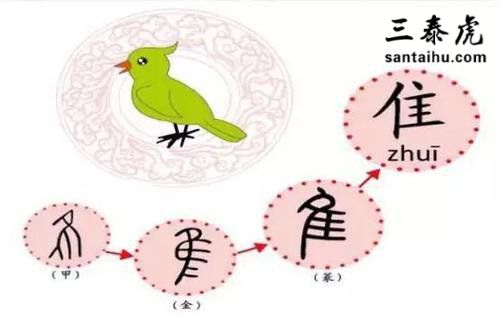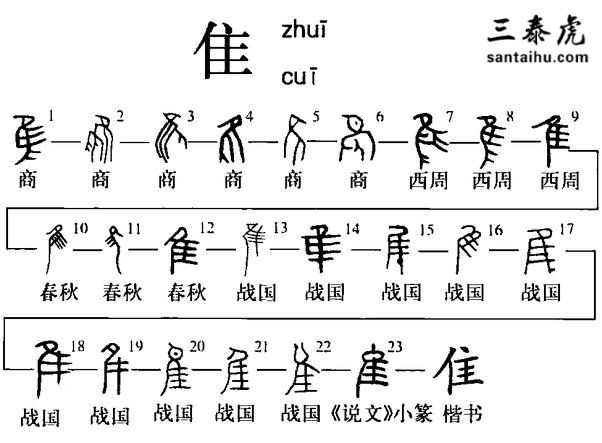Is traditional Chinese better than simplified Chinese?
繁体中文比简体中文好吗?
以下是Quora网友的评论:
Jia Ming Wang
Well, since the first confirmed appearance of the Chinese characters in the Shang Dynasty (商朝; 1600 BC-1046 BC), Chinese characters have gone through a long period of evolution.
During the Shang Dynasty, the Chinese characters were designed to represent the real-life objects.
Let’s look the example of the character 隹 (zhuī).
嗯,自从商代首次出现汉字(商代:公元前1600年至公元前1046年),汉字经历了漫长的演变过程。
在商代,汉字的样式代表着现实生活中的物体。
让我们看看隹(zhuī)这个汉字。

In the begng (during the Shang dynasty), this character represented a bird (usually a short-tailed bird). However, it was a very complicated character. Hence, it has been simplified from time to time and the current form is 隹. This character is one of the very important Chinese character radical.
Here is a comprehensive evolution track of the character 隹 (zhuī):
在最初出现(商代)时,这个字代表一种鸟(通常指的是一种短尾鸟)。但在当时这是一个非常复杂的汉字。因此,它经历了不断的简化过程,目前的字形是隹。这个汉字是中国汉字中最重要的部首之一。
以下是隹(zhuī)这个字的完整演变过程:

Is traditional Chinese better than simplified Chinese?
This question doesn’t have a one line answer. However, the point is, the shapes of the traditional characters were close to the real-life objects. However, they were complicated to write.
The simplified characters are simple to write. However, their shape is different and often they look very different from the real-life object that they are supposed to represent.
繁体中文会比简体中文好吗?
要回答这个问题,不是一句话那么简单。关键区别在于,传统汉字的字形较为接近现实生活中的物体,但写起来更为复杂。
简体字写起来很简单。但字形很不相同,看起来往往和现实生活中应该代表的物体有着很大差别。
So, should you learn the traditional Chinese characters or the simplified ones?
Well, if you plan to live in Hong Kong, Macau, or Taiwan, then go with the traditional. However, if you plan to live in the mainland China, then simplified characters are your best bet.
你应该学习繁体字还是简体字呢?
这么说吧,如果你打算在香港、澳门或台湾地区生活,那就选择繁体字。但如果你计划在中国大陆生活,那么简体字才是你最好的选择。
Samuel Torres
I think it’s a dumb debate.
A bit of background — I attended a Chinese school run by mainlanders that used mainland Chinese textbooks, so most of the time we read and wrote in Simplified Chinese. However, that didn’t mean we didn’t have any exposure to Traditional; in fact, I’ve had an equal share of exposure to Traditional from reading the World Journal, a Taiwanese newspaper in the US, and visiting the Philly and NYC Chinatowns where Traditional Chinese still rules. I haven’t done an exact count yet, but I’m sure I understand more Simplified Chinese characters than Traditional characters, although the difference is marginal at best.
我认为这是一场愚蠢的讨论。
稍微介绍一下背景—我在一所大陆人开办的中文学校上学,学校使用大陆的教科书,所以大部分时间我们都用简体中文进行阅读和写作。但这并不意味着我们没有繁体字;事实上,我阅读的台湾报纸《世界日报》,逛费城和纽约的唐人街,对传统文化也有了同样的了解。我没有做过确切的统计,但我确定我理解的简体字比繁体字多,但两者的差别并不大。
Debating whether Simplified or Traditional is better is like debating whether manuscript or cursive is better, or whether Times New Roman or Calibri is better — everyone has their own preferences depending on their background, education, and values.
Personally, I prefer Simplified because that’s how I was raised to write Chinese and it has fewer strokes than Traditional, which makes it easier to write. The Traditionalists would argue that Simplified Chinese is no longer necessary because people can type Traditional characters as easily as they can type Simplified. I would argue that while the keyboard has made the number of strokes a less important factor in the Simplified-Traditional “debate,” people still write by hand, which takes time. Some people, including myself, appreciate just having to write 龟 instead of 龜, or 为 instead of 為 on paper.
争辩究竟是简体字好还是繁体字好,就像争辩手写体好还是草书体好,Times New Roman好还是Calibri更好一样—每个人都有自己的偏好,取决于各自的背景、教育和价值观。
就我个人而言,我更喜欢简体中文,因为我从小就写简体中文,简体中文的笔画也比繁体字少,书写起来更简单。传统主义者会争辩说,简体中文已经没有必要了,因为人们可以像录入简体字一样轻松地录入繁体字。但我想说的是,虽然在简-繁的“辩论”中,键盘输入让笔画数量的重要性大大降低,但人们仍然还是会用手写字,需要花费时间。有些人,包括我自己,都喜欢在把“龜”字写成“龟”字,或者把“為”写成“为”。
Then again, I’m talking to people who were raised to write Traditional Chinese and don’t know what it’s like to write characters the “easier” way, so what’s the point of debating?
Maybe it’s just me, but it appears like Simplified and Traditional Chinese are mutually intelligible for the most part — if you can read Simplified, you can definitely read something printed in Traditional, and vice versa. Even when you stumble upon a character of the other type that you can’t read (that’s happened to me before), usually the problem solves itself when you look at the surrounding “neutral” characters and make an inference.
话说回来,我这是在跟那些从小学写繁体字的人说话吧,他们好像并不知道用“更简化”的方式书写汉字是什么感觉,所以这种争论又有什么意义呢?
也许这只是我自己的问题,但是简体字和繁体字在很大程度上似乎是可以相互理解的—如果你能读懂简体字,那么你肯定能读繁体字,反之亦然。即便你偶然发现了一个不认识的字(我以前也遇到过这种情况),基本上也可以通过前后的字进行推断,问题也就自行解决了。
Ultimately, I think it’s important that people gain sufficient exposure to both Simplified and Traditional characters. Simplified Chinese is the standard type of Chinese used in mainland China — a place with over a billion people — so to overlook it on the grounds that it is unsophisticated does not do any favors. On the other hand, our ancestors created the foundations of our culture with Traditional Chinese — and Traditional is still used by many Chinese in Hong Kong, Macau, Taiwan, and overseas. So to stay away from Traditional on the grounds that it is complex does not do any favors, either.
最后,我认为让人们充分接触简体字和繁体字都很重要。简体中文是中国大陆使用的标准中文,中国大陆有超过10亿人口,因此,以简体中文不成熟为由忽视它,是没有任何好处的。另一方面,我们的祖先用传统汉字创造了中国文化的基础,香港、澳门、台湾地区和海外的许多中国人仍然使用繁体字。因此,以繁体字太复杂为由排斥它,也是没有任何好处的。
Dr Lagolee
The question of whether traditional Chinese is better than simplified Chinese depends on the context and the specific needs of the users. Both traditional and simplified Chinese characters are used in different regions and countries, and each has its advantages and purposes.
繁体中文是否优于简体中文,取决于语境和用户的具体需求。繁体字和简体字在不同地区和国家使用,各有优点和用途。
Traditional Chinese:
Traditional Chinese characters are used primarily in Taiwan, Hong Kong, and Macau, as well as in many overseas Chinese communities.
Traditional characters are generally more complex and have a longer historical tradition, dating back to ancient times.
They preserve the cultural and historical heritage of the Chinese language and are often preferred in traditional calligraphy, literature, and artwork.
繁体字:
繁体字主要在台湾、香港、澳门以及许多海外华人社区使用。
繁体字通常更复杂,有着更悠久的历史传统,可以追溯到古代。
繁体字保留了汉语的文化和历史遗产,传统书法、文学和艺术品中往往更喜欢使用繁体字。
Simplified Chinese:
Simplified Chinese characters were introduced in mainland China during the mid-20th century to increase literacy rates and make reading and writing more accessible to a larger population.
Simplified characters have fewer strokes and are generally easier and quicker to write and read.
They are the official writing system used in mainland China, Singapore, and Malaysia.
简体字:
20世纪中期,中国大陆引入了简体汉字,提高民众的识字率,让更多的人有能力读写汉字。
简体字的笔画更少,读写起来往往更简单、更快速。
简体字是中国大陆、新加坡和马来西亚使用的官方的书写系统。
Advantages of Traditional Chinese:
Traditional Chinese characters are aesthetically rich and have cultural significance, making them suitable for artistic purposes and preserving the traditional aspects of Chinese culture.
Some people find that traditional characters are easier to recognize and distinguish due to their intricate shapes.
传统汉语的优势:
繁体字具有丰富的审美和文化意义,很有艺术感,保存了中国文化的传统。
有些人发现繁体字因为字形复杂,更容易识别和区分。
Advantages of Simplified Chinese:
Simplified Chinese characters are easier and faster to learn and write, which has contributed to higher literacy rates in mainland China.
They are generally more suitable for digital media and online communication due to their simplicity and ease of ty.
简体中文的优点:
简体字学习和书写起来更容易、更快,这有助于提高中国大陆的识字率。
因为字形简单,容易输入,更适合数字媒体和在线交流。
Ultimately, the choice between traditional and simplified Chinese depends on the target audience, the purpose of the writing, and the cultural context. For example, if the audience is in mainland China or Singapore, using simplified characters may be more appropriate. On the other hand, if the target audience is in Taiwan or Hong Kong or if the content aims to preserve traditional culture, traditional characters may be more suitable.
最后,想在繁体字和简体字之间做出选择,取决于目标受众、写作目的和文化背景。例如,如果目标受众是在中国大陆或新加坡,简体字更合适。另一方面,如果目标受众是在台湾或香港地区,或者文件内容是以保护传统文化为目标,那么繁体字可能更适合。
It's essential to consider the specific needs and preferences of the readers and respect the cultural and linguistic diversity when using either traditional or simplified Chinese characters. Both writing systems have their unique merits and cultural value, and each should be appreciated in its appropriate context.
无论是使用繁体字还是简体字,都要考虑到读者的具体需求和偏好,尊重文化和语言的多样性。两种书写系统都有独特的优点和文化价值,在各自合适的背景下都值得欣赏。
Abraham Williams
There is no definitive answer to this question as it is largely subjective and depends on the individual’s preferences. Some people may prefer traditional Chinese for its more complex characters and longer history, while others may prefer the simplified characters for their ease of use and readability.
这个问题不会只有唯一一个答案,因为它在很大程度上是主观的,取决于个人偏好。有些人可能更喜欢繁体字,因为繁体字更复杂,历史更悠久,而另一些人可能更喜欢简体字,因为简体字易于书写,可读性强。
Scottilynne Blank (‘Scottie’)
Neither is inherently better than the other. It really depends upon the settings in which they find use. Traditional Chinese generally shows more components and textual meaning yet takes more effort to write unless using digital inputs, while simplified Chinese can be written faster and is more generalized and abstracted. Both modes of writing Chinese characters still can be written in cursive as well.
这两者并没有天生谁比谁优秀,好与不好取决于使用环境。繁体字通常显示更多的要素和文本含义,但除非使用电子设备录入,否则书写起来确实费劲。简体字写起来更快,更普及,也更抽象。这两种字体类别都可以用草书书写。
Erin Vastola
As a non-native Mandarin speaker, I can only comment from my experience learning both writing systems. I studied simplified Chinese first, and then traditional while living in Taiwan. Both serve important purposes and I wouldn’t say one is necessarily better than the other.
作为一个母语不是普通话的人,我只能从我学习这两种书写系统的经验来评论。住在台湾时,我先学了简体中文,然后学了繁体中文。两者都有重要的作用,我不会说其中一个一定比另一个更好。
Reasons to Learn Simplified:
1.You want to travel to Mainland China or Singapore, or live, study, or work in those places. Simplified Chinese is used almost exclusively in these areas.
2.You want to communicate with as many people as possible, as there are many more users of Simplified than Traditional characters. Chinese social media and websites are all in Simplified characters.
3.You write a lot of handwritten Chinese. Simplified is faster and more convenient for writing. If you’re a student taking a timed test in Chinese, writing in Simplified will save you a great deal of time.
学习简体字的理由:
1.如果你想去中国大陆或新加坡旅行,或在这些地方生活、学习或工作,那么这些地区基本上只使用简体字。
2.如果你想和尽可能多的人交流,那么简体字的用户更多。中国的社交媒体和网站都是使用简体字。
3.如果你需要手写很多汉字。简体字写起来更快、更方便。如果你是一名需要参加汉语限时考试的学生,用简体书写会节省你很多时间。
Reasons to Learn Traditional:
1.You live, study, or work in Taiwan, Macau, Hong Kong, or Chinese diaspora communities that use Traditional, or you want to travel to those places. Almost all media and print in these areas is in Traditional Chinese.
2.You want to study Classical Chinese, since older Chinese texts are usually written in Traditional characters.
3.You eventually want to learn another East Asian language, such as Japanese. Since kanji evolved from Traditional characters, you will have an advantage in this area.
学习繁体字的理由:
1.如果你在台湾、澳门、香港或使用繁体字的中国侨民社区生活、学习或工作,或者你想去这些地方旅行。在这些地区,几乎所有的媒体和印刷品都使用繁体字。
2.如果你想学习文言文,古代文章通常都使用繁体字。
3.如果你最终目标是想学习另一门东亚语言,比如日语。因为汉字就是从古汉字演变而来的,所以你在这方面会有优势。
 (VIP)这是印度人的群聊截图,在美国
(VIP)这是印度人的群聊截图,在美国 (VIP)一个在中国学会中文的印度人,
(VIP)一个在中国学会中文的印度人, (VIP)印度疑神疑鬼,沦为了世界笑柄!
(VIP)印度疑神疑鬼,沦为了世界笑柄! 如果印度的软实力比中国高,那么外国
如果印度的软实力比中国高,那么外国 (VIP)羡慕达曼人入籍中国后的幸福
(VIP)羡慕达曼人入籍中国后的幸福 (VIP)在中国工作的印度员工:印度人
(VIP)在中国工作的印度员工:印度人 如果中国崛起为超级大国,中文能取代
如果中国崛起为超级大国,中文能取代 中文真的是全世界最难学的语言吗
中文真的是全世界最难学的语言吗